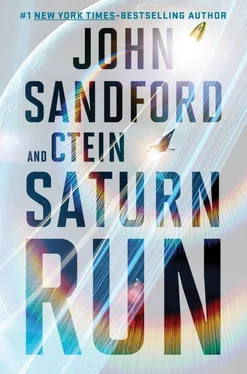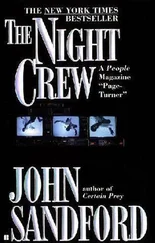Lossness grimaced. “Not enough to matter. Constant-boost trajectories eat up energy like a son of a bitch. If we could figure out how to up the ship’s power by fifty percent, it wouldn’t trim more than a month off the travel time, and that’s still too close for comfort. And, anyway, we can’t do it.”
Vintner looked up from his third cheeseburger—Crow marveled, where did the man put it all?—“Gene, any chance your guys didn’t optimize the trajectory for the shortest trip?”
“You’re kidding, right? Fastest is what we asked for—fastest is what we got. But if it will make you happier…” Lossness checked the time. “It’s the middle of the night in California… he should be home. I could call our orbit maven at JPL.”
“Do it,” Crow said.
A few minutes later, a sleepy-looking David Howardson peered at them from a vid screen. “This is Dave. Hey, Gene… Ah, let me guess. The timetable’s shot.”
“In spades. Any chance in hell that you didn’t pull together the fastest trajectory for our ship?”
Howardson gave him a look.
“I didn’t think so,” Lossness said.
“I take it there’s no possibility of making the ship significantly faster, right?” Howardson asked. He was pulling up ship’s specs and orbital simulations on his slate while he talked.
“Not in the time we have left,” Lossness said. “Sorry to wake you. We need to get back to brainstorming before Santeros has us dismembered.”
“Hold on a sec.” Howardson was reading through his logs. “I’m looking at the simulation optimization you requested six months back. It’s the right answer—it gets you there fastest, which is what you asked for. You wanted the fastest trip because it reduces the expenditure of life-support supplies.”
“Yeah?”
“But now you’ve changed the question. Implicitly, anyway. You don’t want to get there fastest, you want to get there soonest. Right?”
Crow interjected, “What’s the difference?”
Dave was dragging orbital curves around on his screen, fiddling with launch dates and noting arrival times. “The difference is that you’ve got so much delta-vee in this ship that you’ve got a huge launch window. It’s like the better part of five months. The fastest trip is at the end of that launch window, sometime in December of next year. But you could launch as early as, mmm, July? I’ll have to do some numbers to nail it down. You’ll still get to Saturn. It’s just that the trip takes longer. But let me see… mmm, it’d only take about a month longer. If you’re able to launch in July, that’d buy you four months on the ETA. You get to Saturn for Christmas—that’s a rough guess, of course. I’d need to run a finer-grained simulation.”
Gene said, “Get on it.”
Howardson grinned. “There is one catch, though.”
Crow asked, “What?” in a tone that suggested he didn’t want to hear about catches.
The grin disappeared. “The ship’ll be doing a flyby of the sun. If you launch in late July, Saturn will be on the far side of the sun. You don’t launch out, you launch in, right toward the sun, swing past it and let its gravity bend the ship’s trajectory so that it’s on target for Saturn on the far side.”
“How close are we talking?” Lossness asked.
“Couldn’t say quite yet. Looking at my pictures here, I’d say somewhere inside the orbit of Mercury, maybe as little as 0.2 AU.”
“Thanks. Get back to me when you’ve got the refined model.” Lossness logged off the connection.
Vintner looked at Lossness. “Can we advance the schedule that much? Launch in nine months instead of fourteen?”
Lossness nodded. “Pretty much got to, pending Dave’s finished simulation. And we’ll need a design mod for close solar operations.”
Crow: “I’m guessing your engineers are gonna love that.”
Becca got a call from Vintner just before dinnertime. From the background, she could tell he was in his private office, which was little more than a cubbyhole. He used it for private conversations.
“Hey, Becca. Is this a good break point?”
“Hiya, Jacob. As good a time as any,” Becca said. “We finished another control simulation. We’re doing good here.”
“You may not feel that way in a minute. I’ve got news you’re not gonna like.”
“Santeros scrubbed the mission?”
“That’d make life simpler, not harder. She’s advanced the launch date by five months. You’ve got nine months to get ready.”
Becca responded, and when she ran out of breath, Vintner asked cheerfully, “All done? ’Cause, you know, you were repeating yourself there at the end. I think you said ‘bitch’ at least four times and ‘motherfucker’ five or six.”
“Funny. What in the hell is she doing?” Becca asked. She could feel the heat in her face: she must be glowing red on Vintner’s screen.
Vintner filled her in on the Chinese mission status and the planning session on the night before. “So that’s the size of it. I’m sending you Howardson’s new trajectory model right now.”
Becca blinked up the plots and the time markers, read through them. “Okay, that’s clever. Cutting it a little close to the sun, aren’t we?”
“Yeah, the ship design guys’ll have to rig up a heat shield for the close approach, so we don’t overload our cooling systems. Shouldn’t be a big deal. We’ll deploy an aluminized plastic film parasol that will reflect ninety percent of the extra sunlight. We’ll jettison the parasol on the way outbound. And speaking of heat, how will this impact your cooling system?”
Becca hummed for a minute. “Well, absent any clever tricks, it’ll diminish my thermal outflux by, I’m guessing, maybe twenty-five percent for about two weeks. Only while we’re within about a quarter AU of the sun. We’ll have to cut back on thrust, but that shouldn’t cost us more than a couple of days and we’re picking up, what, four months, after we add back in the extra flight time? Couple days one way or another won’t make a difference.”
Vintner nodded. “I’ll leave it to you to coordinate with the propulsion engineers and get a modified thrust profile to Howardson to plug into his model.”
“Jacob, do we need all five months? I mean, do we really have to launch at the beginning of the launch window?”
Vintner sighed. “Honestly, I don’t know. Probably not. But this is turning into more of a race than we had planned, and we don’t know what we’re going to find out there or how long we’re going to have to stick around investigating it before heading back to Earth. We don’t want to collide with the Chinese—that’s a party Santeros wants to avoid.”
“Okay.”
“Which leaves the big question. Can you complete your part of the project in nine months?”
Becca asked, “What happens if I say no?”
“Santeros doesn’t like to be told no. If I have to tell her you’re not up to it, she’ll send me off hunting for a replacement,” Vintner said. “If I hunt long enough, eventually I’ll come across someone who’ll say yes, just for the opportunity.”
Becca sighed. “No doubt. But they won’t be able to do it. There’s not enough time for them to come up to speed on my design and not enough time for them to come up with one of their own.”
Vintner nodded. “That’s pretty much my take on it. Even if you don’t think you can do it, the odds are still better if you do it than if someone else tries. So, what the hell. Say yes.”
Becca fidgeted. Buying into a schedule she didn’t believe in was a plausible path to professional suicide. On the other hand, quitting in midstream would also trash her reputation. Game theory, she thought. If I quit now, I keep my professional integrity and it’s a sure loss. If I stick it out, there’s a chance I might be able to pull it off and no one will know that I was blowing smoke. A guaranteed loss vs. a possible win.
Читать дальше








